
UPDATE: The United Club reopened on October 7, 2025 after the health issues flagged in a September 2025 inspection were corrected. Per the latest inspection report:
The Cease Operations Order has been lifted and the sticker can be removed by the establishment based on inspection results. A reinspection to assess compliance will be conducted at a later date.
A few minor outstanding issues remain, mostly equipment-related, but most of the violations were corrected.
During the closure, United Club members and other eligible guests were given a $25 permit for use in the terminal.
My original story, from September 30, 2025, is below.
It seems that some problems persist…sometimes over 15 years.
One Mile At A Time shares that the Philadelphia (PHL) United Club lounge has been shut down by health authorities for numerous violations, many centering around hot water.
Here’s a look at the food facility inspection report:
1 No person shall operate a food establishment that handles, prepares or serves non-prepackaged potentially hazardous food who does not have present and in the employ of the food establishment at all hours of operation at least one (1) person with a valid Food Establishment Personnel Food Safety Certificate issued by the Department. The person in charge has a class certificate but no Philadelphia Health Department issued Food Manager Food Safety Certificate. The application will be emailed with this report.
8 Soap and a handwash reminder sign was not available at the handwash sink in the food prep area. These items were provided during the inspection.
8 Hot water (at or above 100 degrees F) was not readily available at the handwash sink in the food prep area. The water was probed at 74.8 degrees F maximum. The person in charge turned on the hot water at the pipe below the hand sink during the inspection.
14 The sanitizer and dish detergent dispensers at the prep area 3 bay sink are not working. The person in charge manually added the required solutions. Staff are presently using the warewash machine.
36 -Visible physical evidence of insect (fly infestation) activity observed in the men’s toilet room area. -Visible physical evidence of insect (flies) activity observed in the bar area.
39 Sponges observed in the garbage grinder sink being used to clean food contact surfaces.
41 Food dispensing utensil in the corn nuts observed in direct contact with food and not having handle stored above the top of the food.
45 Equipment not in good repair: -The sanitizer and dish detergent dispensers are not working at the 3 bay sink in the food prep area. -Splash guard is not provided between the food prep sink and the handsink. -An under counter refrigerators in the bar area is not maintaining a temperature of 41 degrees F or lower. Do not use any refrigerator to store potentially hazardous foods that can not maintain a temperature of 41 degrees F or lower.
47 Observations: -Flies observed landing on surfaces in the bar area. -Black staining in lower cabinets in the serving area.
48 Hot water was not available at the prep area hand sink. Water at or above 100 degrees F was provided during the inspection.
49 -Observed drainage pipes from coffee dispenser sitting inside the catch basin rather than twice the diameter of the water inlet pipe and/or at least a 1 inch air gap above the catch basin. -The food prep sink pipe is sitting within the catch basin rather than at least twice the diameter of the water inlet line or 1 inch above the catch basin.
51 Small flies observed on sink counter, walls, and ceiling surfaces in the men’s toilet room.
53 Observations: -Food debris on floor perimeters in the food prep area. -Soiled catch basin in the cabinets in the service area. -Damaged and moved ceiling tiles in the rear storage area.
53 Mop observed stored in the bucket rather than hanging on a utility rack.
As a former Philadelphia resident and frequent visitor to this lounge, I remember the same problem…in 2010. I even wrote about it!
Some things do not change…
Let’s hope that United finally gets its hot water issues fixed! In the meantime, may I suggest the Centurion Lounge?

Here’s a story about the same problem I published on September 26, 2010, one of my earliest blog posts.
United’s Philadelphia Red Carpet Club Closed by Health Department
As I was checking in for my flight to Chicago Thursday morning at Philadelphia International, I heard an agent call my name from behind me.
I turned around and was surprised to find my favorite Red Carpet Club attendant walk up. “Bad news Mr. Klint. The Red Carpet Club is closed. We just got word a few hours ago.”
I jokingly asked if the rats from the C7 Red Carpet Club had Dulles had migrated north, to which she laughed (though obviously aware of the IAD rodent issue), and said, “No. No. It’s nothing like that.”
When pressed, she told me that the health department temporarily shut down the club due to “hot water issues.”
Whew. I was really thinking rats or cockroaches, so her answer was actually relieving.
I responded, “So does this mean we’re finally going to get new bathrooms?”
She laughed and said, “Nope. Probably not. You’ll have to use the US Club today.” She also stated that she was unaware when the club would be able to re-open.
A hastily prepared sign outside the Red Carpet Club door did not even provide the details above.
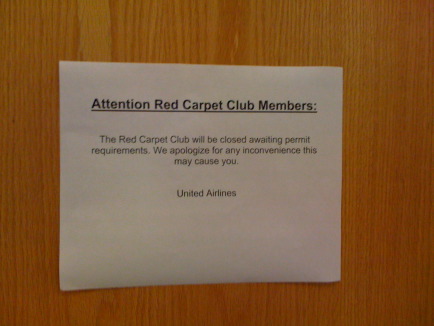
If United is reading this blog: PLEASE USE THIS OPPORTUNITY TO RE-MODEL THE BATHROOMS. You’ve got great agents working in the club, but they are embarasssed and your Red Carpet Club patrons are frankly tired of the grimy bathroom.
For those who haven’t had the pleasure of visiting the PHL Red Carpet Club, here’s a few pictures from the men’s bathroom (note there is still ashtrays next to each urinal):
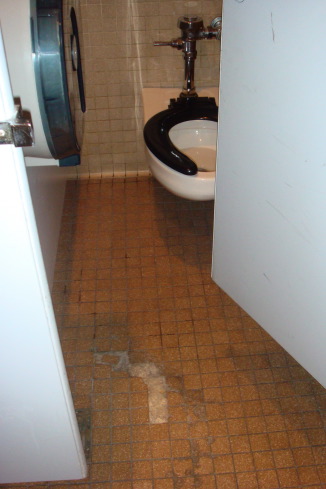
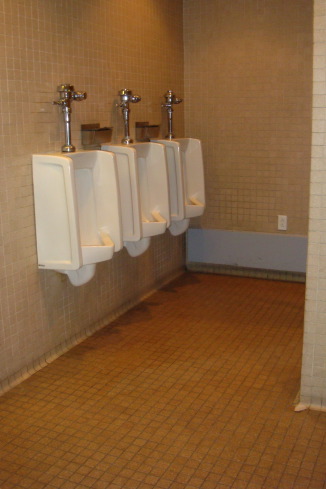
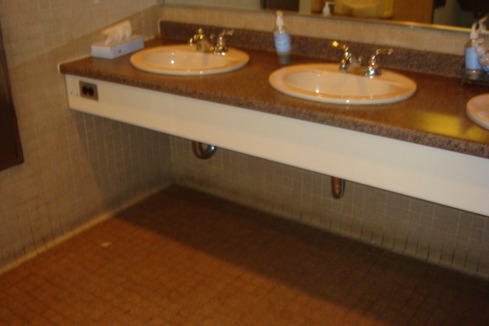
So I used the US Airways Club instead. It’s a nice club with very clean bathrooms, though the Red Carpet Club has a better breakfast spread: the US Club only offers yogurt, danish, and apples.
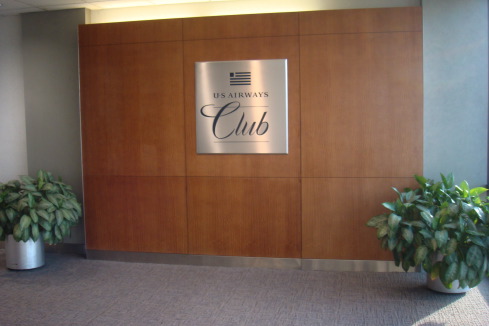
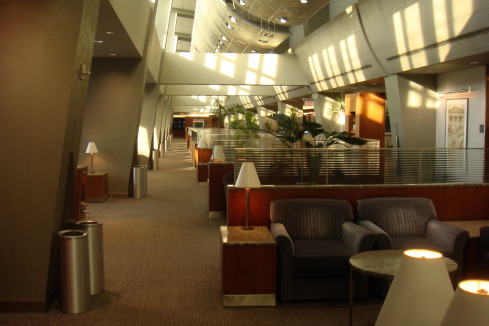
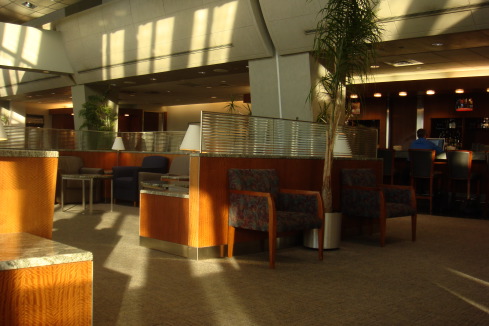
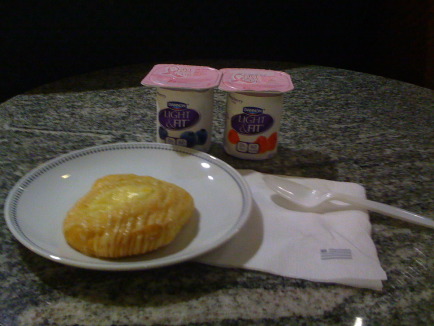
My concern is that United may just say “to heck with it” and close the club. There is plenty of space in the US Club and it’s only seven minutes away by foot.




I have been in or very closely associated with the restaurant business for more than 30 years. A health department can close a restaurant down at any time for not having hot water but rarely does because it is usually quickly fixable. When it does it means there are a lot of other violations/issues which can warrant closing the food service establishment but they usually entail a grace period for correction and the inspector feels the establishment should be closed immediately. By invoking the hot water violation the inspector closes the business immediately.
In most cases it means the establishment food safety practices are substandard and its customers health is at risk. Less often it means that the establishment is promising to correct problems but continues not to (like the missing tiles) and the inspector feels the business is not going to correct them.
I tried to fine the inspection online [ http://tinyurl.com/y3f7uvo ] but there is no record in the database for this business. I wonder if they were operating without a permit also. US Airway shows two business which passed their last inspection.
Restaurants are also a function of the employees . If the employees are unclean and/or slovenly , so will be the food .
Restaurants are also a function of the neighborhood . If the neighborhood of the restaurant is unclean , so will be the food .
I say , the only types of restaurants in which I have had confidence were family-owned with only family employees , (without minimum wage employees) , and I have seen the kitchen . They are very rare in the U.S. More common in Japan and Germany .
Restaurants have a primary goal to make money , and the health of the customers is not an obvious goal in U.S.
@Michael: Thanks for your analysis. Your hypothesis makes sense.
Hopefully UA will finally update the bathrooms, even if it means the club is closed for a month or two.
Whats an “eat urinal”? 🙂
@Reid: That’s not something you want to eat out of! 😉
PHL is still the worst major airport in America and an embarrassment to the city. The bathrooms are horrible and still allows homeless living by baggage claim.
And Michael 100% hit it. The first thing inspectors, who in PA work for the Department of Agriculture, check is food temps and other public health risks. If these are not an issue the rest of the inspection will go fine and the “minor” things will be noted without follow up required. They are there for both the public health and to help the operator see things that could become dangerous but may be being missed in the daily operations with a new set of eyes. As he stated this is last step when they realize warnings and revisits aren’t helping and the facility isn’t showing a commitment to food safety.
My next question would be who operates these clubs? I would assume airlines subcontract the operations other than admission to a 3rd party and would have remedies for the public hit their reputation takes when this happens. At minimum they need a new operator to fix this mess.
Agree , especially the third paragraph . Likely subcontracted whilst paying attention to the bottom line . Result : cheap labor , and not washing hands in hot water . Unfortunately , we need a Musk-type or a Kennedy-type to regulate restaurants in the U.S.
To the contrary. I think it perfectly represents the city.
Based on some basic research I did, it appears thaf Sodexo may be the catering operator of the United Club at PHL. It appears that United outsources club operations at most (or perhaps all) non-hub outstations. But at some (or all) hubs, clubs are staffed by bona fide United employees.
But the big 3 legacy US carriers appear to use a combination of Compass/Eurest, LSG, HMS Host/Avolta and Sodexo for some or a subset of their club operations.
I will be very honest, there are some airport lounges that I get in, look at the food and say “no thanks”. More and more I became a “bottle of water” kind of a guy and skip all the unnecessary processed food served on these lounges. PHL and CLT have to be the worst major airports in the country by a lot and I agree with @Dave Edwards above that it is a huge embarrassment to those cities.
Couldn’t UA have catering deliver the Polaris leftovers to the lounge?
Gross.
Same problem in 2010?
I was thinking about staying in small Paris hotel until I read a review of a room on the top floor that matched the description of the room that my parents stayed in 1995. The drainage was so poor that you had to jump to the bedroom, said the review. That exactly described the situation in 1995 for, likely, the same room.